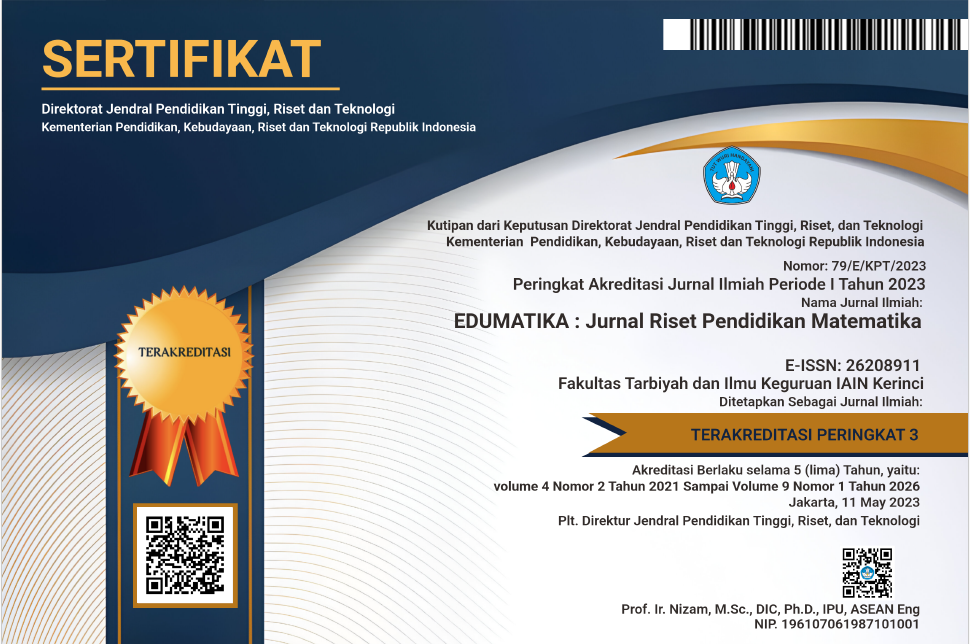Pengaruh Gaya Kognitif Terhadap Kemampuan Pemecahan Masalah Matematis Siswa
Abstract
The objective of this study is to determine the effect of cognitive style on students’ mathematical problem-solving ability. This study used the survey method with a quantitative approach. One class consisting of 32 students was selected by purposive sampling for the study sample. A total of 17 students have a field-dependent (FD) cognitive style, while 15 other students have a field independent (FI) cognitive style. GEFT and mathematical problem-solving ability test instruments were used to collect research data. Data were analyzed using Pearson Product Moment correlation test and a simple regression test. The research results found that there is a strong positive relationship between cognitive style and students’ mathematical problem-solving ability, indicated by correlation coefficient r = 0,636. In addition, cognitive style has an effect on students’ mathematical problem solving ability of 40,5% through a linear relationship Ŷ = 3,703 + 0,512X.
Downloads
References
Arnup, J. L., Murrihy, C., Roodenburg, J., & McLean, L. A. (2013). Cognitive Style and Gender Differences in Children’s Mathematics Achievement. Educational Studies. 39(3), 355–368.
Charles, R. (1994). How to Evaluate Progress in Problem Solving. Virginia: National Council of Teachers of Mathematics.
Elita, G. S., Habibi, M., Putra, A., & Ulandari, N. (2019). Pengaruh Pembelajaran Problem Based Learning dengan Pendekatan Metakognisi terhadap Kemampuan Pemecahan Masalah Matematis. Mosharafa: Jurnal Pendidikan Matematika, 8(3), 447-458.
Hendriana, H. & Soemarmo, U. (2014). Penilaian Pembelajaran Matematika. Bandung: PT. Refika Aditama.
Hendriana, H., Johanto, T., & Sumarmo, U. (2018). The Role of Problem-Based Learning to Improve Students' Mathematical Problem-Solving Ability and Self Confidence. Journal on Mathematics Education, 9(2), 291-300.
Indrawan, P. & Poppy, Y. (2016). Metodologi Penelitian Kuantitatif, Kualitatif, dan Campuran untuk Manajemen, Pembangunana, dan Pendidikan. Bandung: PT. Refika Aditama.
Jena, P. C. (2014). Cognitive Styles and Problem Solving Ability of Under Graduate Students. International Journal of Education and Psychological Research, 3(2), 71-16.
Khatib, M., & Hosseinpur, R. M. (2011). On the Validity of the Group Embedded Figure Test (GEFT). Journal of Language Teaching & Research, 2(3), 640-648.
Lu, H. & Lin, P. (2018). A Study on the Effect of Cognitive Style in the Field of STEM on Collaborative Learning Outcome. International Journal of Information and Education Technology, 8(3), 194-198.
Mall-Amiri, B., & Arabgol, M. (2015). The Comparative Impact of Visual Aids and Contextualization on Field-dependent and Field-independent EFL Learners’ Vocabulary Retention. Journal of Language Teaching and Research, 6(1), 163-171.
Mefoh, P. C., & Ezeh, V. C. (2016). Effect of Field-Dependent versus Field-Independent Cognitive Styles on Prospective And Retrospective Memory Slips. South African Journal of Psychology, 46(4), 542-552.
Mefoh, P. C., Nwoke, M. B., Chukwuorji, J. C., & Chijioke, A. O. (2017). Effect of Cognitive Style and Gender on Adolescents’ Problem Solving Ability. Thinking Skills and Creativity, 25, 47-52.
Onyekuru, B. U. (2015). Field Dependence-Field Independence Cognitive Style, Gender, Career Choice and Academic Achievement of Secondary School Students in Emohua Local Government Area of Rivers State. Journal of Education and Practice, 6(10), 76-85.
Saracho, O. N. (1997). Cognitive Styles in Early Childhood Education. London: Bergin and Garvey.
Shodikin, A. (2016). Peningkatan Kemampuan Pemecahan Masalah Siswa Melalui Strategi Abduktif-Deduktif pada Pembelajaran Matematika. Kreano, Jurnal Matematika Kreatif-Inovatif, 6(2), 101-110.
Sugiyono. 2010. Statistika untuk Penelitian. Bandung: Alfabeta.
Susanto, B. (2015). Peningkatan Kemampuan Siswa Dalam Memecahkan Masalah Matematika Bentuk Cerita Melalui Pendekatan Scientific Terintegrasi Pada Problem Based Learning (PBL) (PTK pada Siswa Kelas VIIE Semester Genap di SMP Negeri 2 Sawit Tahun Ajaran 2014/2015). Disertasi. Universitas Muhammadiyah Surakarta.















